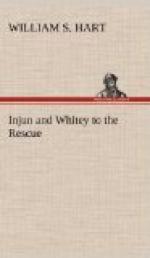Well, once in a while it’s a good thing to forget that you ever were a “city fellow,” and saw wonderful performances, and to be able to enjoy a simple show like this. And I suppose the world is a better place for the Mildinis in it, who travel through rough countries, and for a little while make people forget the hardships of their lives; lives sometimes touched by tragedy.
That’s the way Whitey felt about it when, for the last time, the troupe had left the small raised platform that had been built at one end of the barn to represent a stage, and had retired to the stalls, which served as dressing-rooms.
The men of the audience were leaving, and most of their faces held traces of the pleasure the Mildinis’ efforts had given them; others had returned to their usual hardness. Among the last was one the sight of whom caused Injun to grip Whitey’s arm so forcibly that he almost cried out with pain as he was drawn back into the shadows and Injun pointed out Henry Dorgan.
CHAPTER XIX
THRESHING-TIME
Injun was a being who ran more to feelings, or instincts, than to reasons, and like many persons of that kind his instincts often ran truer to form than the reasons of others. While Dorgan was not a likable man, he was not one whom everybody would distrust; he did not have the word “villain” printed on his face. Yet Injun thought he was one, and if asked for his reasons probably could not have told them.
You know that Injun suspected Dorgan of taking Whitey’s pony, and now Whitey learned for the first time that Injun had seen Dorgan stealing away from the sheep ranch on the night of the war. Whitey wondered why Injun had not told him this before, but it was not Injun’s way to tell everything he knew, even to Whitey. That was one of Injun’s charms.
No one ever had suspected Dorgan of being a sheepman. He might have been at that ranch as a mere visitor. Injun thought he went there on foot, after Monty had been taken away from him. It is well known that in the Old West horse-stealing was considered about the worst crime a man could commit, not only because of the value of the horse, and a man’s being so dependent on it, but because the horse helped to steal itself, as all one had to do was to get on it and ride away. It never would do to accuse Dorgan of the crime without pretty good proof.
Of course, it made Whitey wild to think of any one’s stealing Monty, and as he and Injun stood in a corner of the barn, and talked the matter over, they decided on the following course: they would stay at the Hanley Ranch for a while; Dorgan had not seen them. If he ran away when he did see them, that would be an indication of guilt, but no proof. But if Dorgan stayed on, the boys might be able to get some proof of his guilt. He was a dangerous man to deal with; that made it all the more interesting. If they had known how dangerous Dorgan really was, they might have considered the matter more seriously.




